Home
Translations: frPersonal information
I am a full-time researcher at Inria Rennes within the CAPSULE. I work in cryptology, with a focus on symmetric cryptanalysis, quantum algorithms and post-quantum cryptography.
Previously I was a postdoctoral researcher at the CWI in Amsterdam, in the Cryptology Group where I worked with Marc Stevens. I completed my PhD thesis in 2021 in Inria Paris in the team SECRET (now COSMIQ). My thesis advisor was María Naya-Plasencia and my co-advisor André Chailloux.
Research
Post-quantum cryptography aims at protecting current cryptosystems from an attacker equipped with a large-scale quantum computing device. While such a machine does not exist yet, it is well known that it would be able to break some widely used public-key cryptosystems (for example RSA). This is why the community is designing post-quantum cryptosystems which would be immune to this threat.
The confidence we have in modern cryptosystems relies on a large-scale cryptanalysis effort: cryptanalysts try for years to find weaknesses in designs or improved algorithms for the mathematical problems that underlie their security assumptions. Because of the possibility that a functional quantum computer appears in the future, we need to look not only for classical attacks but also quantum attacks, which make inherent use of the enhanced computational power of such a machine. While the attacker has quantum power, the algorithms attacked are still classical, because we expect them to still be in use twenty or thirty years from now.
This is the area of quantum cryptanalysis, on which my research mainly focuses: * In symmetric (secret-key) cryptography: symmetric cryptosystems such as block ciphers, hash functions, MACs, are commonly admitted to be generally robust against a quantum attacker. While this is true of most designs and in most use cases, many recent works have designed improvements and attacks specific to the quantum setting. My work in this area consists in finding such attacks and establishing more precise estimates of post-quantum security for current symmetric cryptosystems. * In asymmetric (public-key) cryptography: public-key cryptosystems, whether pre- or post-quantum, rely on the hardness of well-formulated mathematical problems such as factoring or finding short vectors in lattices. I work on improving the quantum algorithms which target these problems.
Students
I'm currently co-supervising PhD Students:
- Alisée Lafontaine, from october 2025 to october 2027, with Patrick Derbez
- Aurel Pichollet--Mugnier, from november 2024 to october 2027, with Patrick Derbez and Zoé Amblard (Thales SIX)
- Mathieu Degré, from january 2024 to january 2027, with Patrick Derbez, on automatic tools for symmetric cryptanalysis and meet-in-the-middle attacks
Completed internships:
- Alisée Lafontaine (University of Bordeaux), from march 2025 to august 2025: New tools for quantum rebound attacks
- Jules Rousseau (University of Rennes), from april 2024 to september 2024, with Patrick Derbez: Cube-based cryptanalysis of Ascon and Gift
- Aurel Pichollet-Mugnier (University of Bordeaux), from march 2024 to september 2024, with Zoé Amblard & Nicolas David: Optimized Quantum Circuit of Ascon
- Thibault Didier (INSA Rennes) from june 2024 to july 2024: Optimisation d’un circuit multi-somme réversible pour la factorisation quantique
- Lucie Lahaye (ENS Lyon) from june 2023 to july 2023: Attaques algébriques sur la fonction de hachage Ascon
Projects
I'm currently involved in the following research projects.
-
Ascon-CAT (10/2024 -- 09/2026) This project is a partnership between Alice&Bob, Thales SIX and Inria, financed by the AID, and coordinated by Alice&Bob.
The goal of this project is to perform an integrated quantum security analysis of the lightweight symmetric primitive ASCON, recently selected as a NIST standard. The project will combine the development and analysis of new quantum algorithms, as well as a precise estimation of the resources needed to run them, and a study of implementations in the “cat qubits” platform which is developed by Alice&Bob.
-
ANR QATS (Quantum Attacks and new Tools for Symmetric Cryptanalysis) (03/2025 -- 02/2029)
I'm the PI of this ANR "JCJC" project. The goal is to analyze primitives (such as block ciphers and hash functions) regarding quantum attacks using automatic tools, with an emphasis on the usefulness of these tools.
-
PEPR Cybersécurité - Projet Cryptanalyse [link
-
PEPR Quantique - Projet PQ-TLS [link]
Program committees
- FSE 2026 artifact evaluation committee
- ASIACRYPT 2025
- IWSEC 2025
- SAC 2025
- EUROCRYPT 2025 artifact evaluation chair
- Inscrypt 2024
- CRYPTO 2024 artifact evaluation committee
- CRYPTO 2024
- EUROCRYPT 2024
- CRYPTO 2023
- Editorial Board of ToSC for the year 2022/2023, 2023/2024, and 2024/2025 (current).
Awards
- Prix de thèse du GDR sécurité informatique 2022 [link]
- ASIACRYPT 2021 "Best Paper Award"
Contact
Please contact me preferrably by email:
andre /dot/ schrottenloher /at/ inria /dot/ fr

By Randall Munroe on xkcd.com